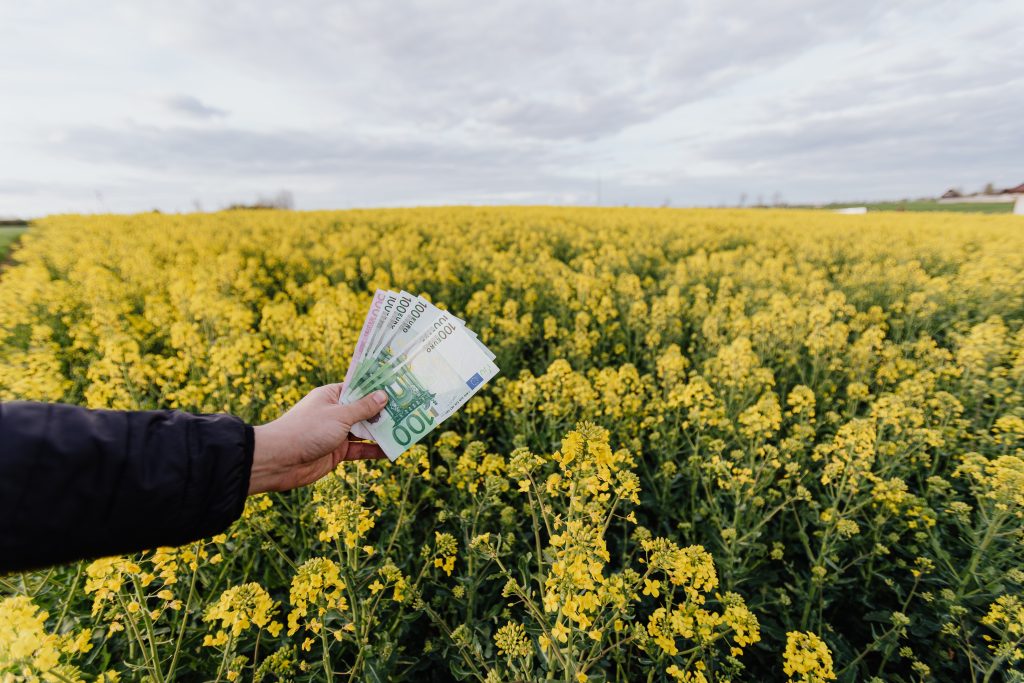Investing in assets that appreciate over time and keep up with inflation is ideal. What if you could invest in a tangible asset that also benefits the community? With a growing population and increasing demand for goods, there is a great opportunity to invest in agriculture. Here are five reasons why you should invest in agriculture.
Investing in agriculture means supporting farmers and their livelihoods while providing more security for your investments compared to the stock market. There are several compelling reasons why you should invest in agriculture, we outlined five below.
Reasons why you should invest in agriculture
- Growing demand
- Diversification
- Long term investment
- Sustainable investment
- Resilience
Growing demand
The United Nations predicts that the global population will reach 9.7 billion by 2050, which means that there will be a significant increase in the demand for agricultural products. As the world’s population grows, so does the demand for food, including grains, vegetables, fruits, and livestock.
Agriculture is a crucial industry as it produces food, which is a basic necessity for human survival. Without agriculture, people would not have access to the food they need to live. Therefore, investing in agriculture can be a smart choice, as it has a growing demand and a stable market.
Investing in agriculture involves putting resources into the production of food and other agricultural products. This can include investing in land, farming equipment, and technology, or supporting farmers through financial investments. Investing in agriculture is not only beneficial to you as the investor, but it can also have a positive impact on the global food supply and help to alleviate hunger and poverty.
The growing demand for agricultural products presents an opportunity for agricultural investors to earn significant returns on their investments.
Diversification
If you’re an investor and you are seeking to diversify your portfolio, investing in agriculture can be a wise decision. Unlike traditional investments such as stocks and bonds, agricultural investments have a low correlation with these assets.
This means that investing in agriculture can help reduce the overall risk of your portfolio by spreading out your investments across different asset classes. When you invest in agriculture, you are essentially investing in physical land. Unlike stocks, the value of agricultural land tends to appreciate over time.
However, it is important to note that returns from agricultural investments are affected by various factors such as commodity prices, the appreciation rate of the land, location of the farm, and other market forces.
For instance, if you invest in a farm located in a region with fertile soil and abundant rainfall, the potential for higher yields and better returns increases. In contrast, if the farm is located in an area with poor soil quality and insufficient rainfall, the yields may be lower, and the returns may not be as significant.
Similarly, the appreciation rate of agricultural land can vary depending on market forces and regional economic conditions.
Overall, investing in agriculture can be a valuable addition to your portfolio as it can provide diversification benefits and the potential for long-term appreciation of the underlying asset. However, it is crucial to conduct thorough research and due diligence before investing in any agricultural venture to minimize risks and ensure potential returns as usual.
Read also: Reasons why you should experience agriculture before you die
Long term investment
Agriculture is a form of investment that requires dedication and persistence as it involves a long-term commitment. Nevertheless, if one invests in the right agricultural projects and manages them efficiently, it can result in substantial returns over time. Since crops take a considerable amount of time to grow and mature, the long-term nature of agricultural investments provides a sense of stability and predictability.
Furthermore, investing in agriculture can be a great way to ensure that wealth stays within a family for generations. Agricultural assets such as farmland can be passed down to heirs, ensuring that the family’s legacy and investment continue. In addition, as the global population continues to grow, the demand for food will also increase, making agricultural investments more valuable in the long run.
Sustainable Investment
Investing in agriculture can be a sustainable investment since it supports the adoption of sustainable farming practices. Sustainable farming methods not only benefit the environment by promoting soil and water conservation, but they also result in higher crop yields and better-quality products.
Therefore, by investing in sustainable agriculture, you can simultaneously contribute to environmental and social objectives while earning a return on your investment. Investing in sustainable agriculture also provides financial stability to farmers, as it reduces the risk of foreclosure from banks.
By investing in sustainable agriculture, you indirectly provide farmers with the necessary capital to increase their yields and productivity. This investment can also help farmers access the tools, inputs, and equipment they need to maximize their crop output.
Overall, investing in sustainable agriculture is not only a sound financial decision but also a socially responsible one that helps to promote environmental sustainability and support local communities.
Read also: Top 10 richest farmers in the world
Resilience
Agriculture has demonstrated its resilience as an investment, even during times of economic uncertainty. This is because food is a fundamental necessity that people require, regardless of the state of the economy. As a result, investing in agriculture can withstand economic challenges, making it a stable investment choice.
Furthermore, the demand for agricultural products extends beyond individual households. Commercial establishments such as hotels and restaurants require a continuous supply of agricultural produce.
As the global population continues to grow, the demand for food will inevitably increase, providing a lucrative market for agricultural products. Investing in agriculture not only supports the industry but also contributes to global food security.

Importance of agriculture
- FOOD PRODUCTION: Agriculture is the primary source of food production, providing the world’s population with a variety of nutritious and healthy food options.
- ECONOMIC DEVELOPMENT: Agriculture contributes significantly to the economic development of many countries, providing employment opportunities for millions of people.
- ENVIRONMENTAL CONSERVATION: Sustainable agriculture practices help to conserve natural resources, preserve biodiversity and mitigate climate change.
- RAW MATERIALS: Agriculture produces raw materials for many industries, including textiles, construction, and fuel production.
- RURAL DEVELOPMENT: Agriculture is an essential component of rural development, helping to improve the standard of living of rural communities through income generation and improved infrastructure.
- FOOD SECURITY: Agriculture plays a crucial role in ensuring food security by producing sufficient quantities of food to meet the nutritional needs of the population.
- CULTURAL SIGNIFICANCE: Agriculture has cultural significance in many societies, providing a sense of community and identity and preserving traditional farming practices and knowledge.
Read also: Problems facing agriculture and solutions
The bottom line
With the increasing demand for organic and locally sourced food, there is a great potential for investment in agriculture. Additionally, new technologies and innovations in agriculture can lead to increased efficiency, productivity, and profitability, making it an attractive investment opportunity.
In summary, investing in agriculture is not only a wise financial decision but also a crucial step towards ensuring food security, reducing poverty, promoting environmental sustainability, and achieving economic growth. These are great reasons why you should invest in agriculture.
